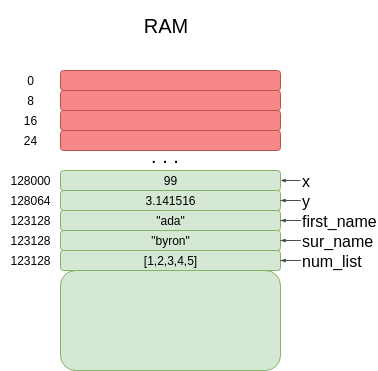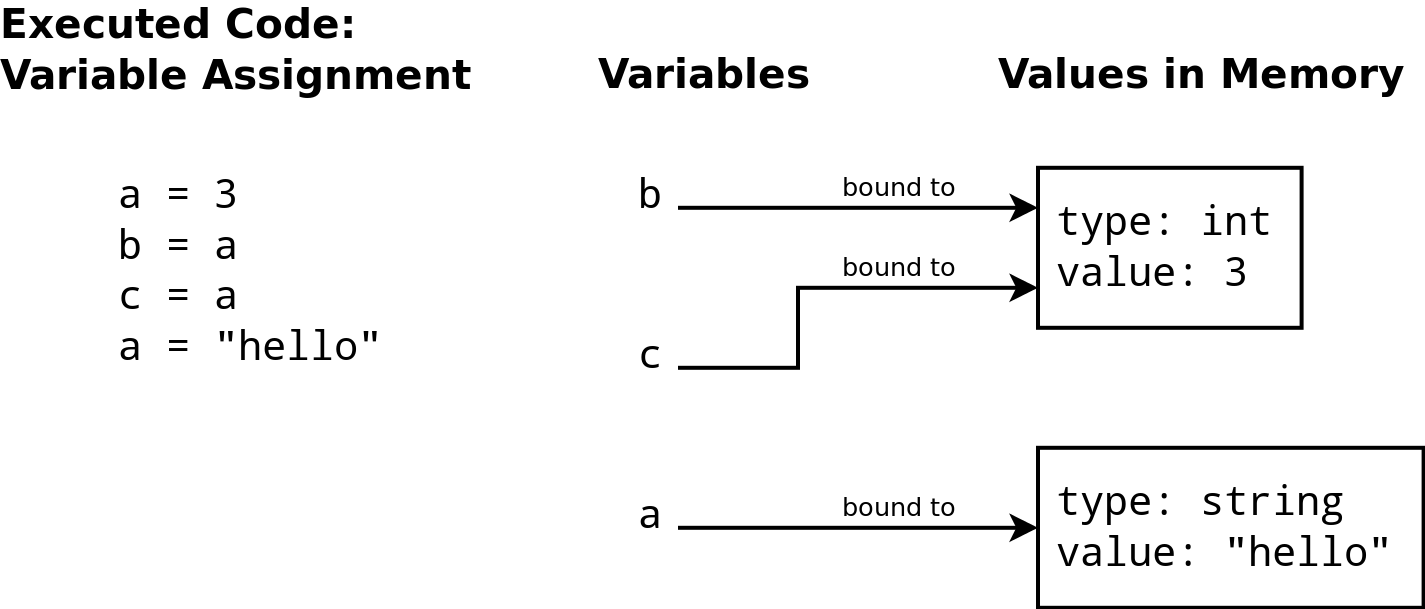Keyboard shortcuts:
N/СпейсNext Slide
PPrevious Slide
OSlides Overview
ctrl+left clickZoom Element
If you want print version => add '
?print-pdf' at the end of slides URL (remove '#' fragment) and then print.
Like: https://wwwcourses.github.io/...CourseIntro.html?print-pdf
Created for
Iva E. Popova, 2022-2023,


Variables/Value Names
Variables in Python
What is a variable in Python?
- A name (identifier) for "container" (placed in RAM) in which values can be stored and retrieved
- When we say that we set value in a variable, it should be understood as to write a value into the corresponding container.
- We can get the variable value, i.e. to read the content of the corresponding container
x = 99
y = 3.141516
first_name = "ada"
sur_name = "byron"
num_list = [1,2,3,4,5]

Identifiers rules
- Variables names should follow next rules:
- Start with letter or underscore
- Followed by zero or more letters, underscores and digits
- Variable names are case-sensitive
- Identifiers and keywords @python docs
x1 = 5 # ok
1x = 5 # error
_ = 5 # ok
__x__ = 5 # ok
my-var =5 # error
a = 5
print(a) # 5
print(A) # NameError: name 'A' is not defined. Did you mean: 'a'?
Naming Conventions
- Naming convention is not a rule, but a generally agreed scheme for naming things.
- Naming conventions make programs more understandable by making them easier to read.
- Different programming languages uses different naming conventions
- Python uses snake_case naming convention for naming variables
- variable names should be lowercase, with words separated by underscores. That naming convention is known as snake-case.
user_name = 'Ada' # snake_case -> used in Python
userName = 'Ada' # camelCase -> not used in Python for simple variable names
Assignment Operation (Name binding)
- Name binding is the association between a name and a value
- We can bind a value to a name with the
assignmentoperator (=) - We can check the unique identity of a value by the
id()built-in function.
a = 2
print(id(a))
# 140168672297232
Name binding

Exercises
Academical to Astronomical hours converter
The task
- Given that:
- An astronomical hour consists of 60 minutes
- An academical hour consists of 45 minutes
- For each 3 academical hours there are 15 minutes brake
- Write a Python program, that will print out how many astronomical hours a python course should take, if it consists of 64 academical hours, including the respective brakes
- Try to think of a solution, which will be readable enough and easy to maintain in future
- Write your code in
HW/acad_to_astro_hours.pyfile
Body Mass Index calculator
The task
- Calculate your body mass index (BMI) with Python, given the formula:
BMI = W / (H*H)
where: - W = weight_in_kilogram
- H = height_in_meters
- Your program should outputs the result rounded to 2 digits after the decimal point).
- Try to think of a solution, which will be readable enough and easy to maintain in future (you can use comments and semantic variable names)
- write your code in
HW/BMI.pyfile - Tip: You can use the python's build-in round() function, like:
>>> round(2.1457, 2)
2.15
>>> round(1.4234,2)
1.42
>>> round(1.4284,2)
1.43
HW Submition
- You can submit your files either by:
- upload to your Github account
- Or sending as email attachment
